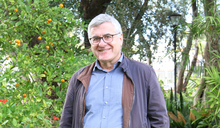01 Jul 2021
Being open to other people’s perspectives

There’ll be lots of talking at the upcoming Diocesan Assembly – of course! It’d be a dull event without conversation.
But according to Pope Francis, the quality of our gathering will be determined by our capacity to listen to one another. In a major speech from 2015 he urged the world’s bishops to foster a listening church: “It’s a mutual listening in which everyone has something to learn...we are one in listening to others; and all are listening to the Holy Spirit.”
So, what should we listen for? And what will we learn?
As Pope Francis intimates, we are listening so that we can discern where the Holy Spirit is leading us as a community of faith. This requires thought and prayer. I see three primary foundations for our listening to the Holy Spirit.
First, we must attend to the person of Jesus of Nazareth because there was a whole history of the Spirit in his life, death, and resurrection. In proclaiming the Apostles Creed each Sunday, we remember that Jesus was “conceived by the Holy Spirit”, and reading the gospels closely we see that the Spirit leads him in every aspect of his ministry. Therefore, our discernment about the community’s future must, firstly, attend to the way that Jesus’ ministry reveals how the Spirit works.
The second foundation for our listening is the tradition of faith through 2000 years of Christian history. Sure, there have been countless failures and betrayals along the way, but Jesus has promised that the Holy Spirit will lead the disciples into the fullness of the truth (cf John 16:13). In each period of history and in many cultures, the Spirit has led the believing community to give new expression to its faith. You and I, then, have a heritage; our communal discernment doesn’t start from ground zero. As the Archdiocese discerns where the Holy Spirit is leading us, we’ll treasure the faith of previous generations – which doesn’t mean that nothing can change.
The third foundation of our discernment is the Holy Spirit’s presence and action in the world today. In his 1990 encyclical on mission, Pope John Paul II makes the strong statement that the Holy Spirit is offered to all: “not only individuals but also society and history, peoples, cultures, and religions”. Therefore, a crucial aspect of our reflection will be about this age; we will be ‘reading the signs of the times’, as Vatican II puts it. There have been important advances in the modern world, perhaps the most significant being a greater recognition of human rights, and a growing recognition of the equality of all people. Of course, there are also profoundly troubling aspects of contemporary culture. So, in discerning where the Spirit is leading our community, we must attend to both the advances and limits of this age.
In summary, our awareness of the Spirit’s presence in the ministry of Jesus, in the history of the Christian community, and in the world and the Church today will be foundational for our discernment.
But perhaps the cut and thrust of conversation among the almost 500 people gathered in September means that we should consider the very human dynamics of listening. After all, Pope Francis implies that listening to one another and listening to the Spirit are interrelated.
If it’s to be a real conversation, two dynamics must be at work. First, real conversation requires of each person a profound openness to other people’s perspectives. Not simply to hear their words, but to understand other’s views as different from my own. And to be ready to be moved by what moves the others – to be ready to bring out the real strength of their stances.
In a second dynamic, this profound openness will lead us to reflect on and refine our own expectations and assumptions. In listening deeply to others, I will come to see that, while I had insight into some things, I had misunderstood others. In this context, I always recall the line of Canadian philosopher Charles Taylor: ‘No understanding the other without a changed understanding of self.’
So then, what will we learn at the Diocesan Assembly? Well, that’s the question. But if we haven’t learned anything – about the faith of the community, or about the Holy Spirit’s presence among us – then, we can be sure that we haven’t listened.
Fr James McEvoy is a priest of the Archdiocese, and teaches theology at the Australian Catholic University, Adelaide.

